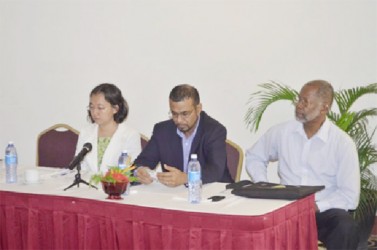The need for improved governance of the mineral sector and a revised mining code were some of the issues raised yesterday at a forum on foreign direct investment in the extractive sector and its impact on the environment.
Consultants Masuma Farooki and Sohinee Mazumdar presented the preliminary conclusions and recommendations of their study at the Herdmanston Lodge. In their presentation, they addressed Foreign Direct Investment and its links to technology, deforestation, damage to the environment and employment opportunities and they repeatedly stressed that the responsibility for management should not be left solely on the shoulders of the government.
The study is a United Nations Development Pro-gramme (UNDP)/Govern-ment of Guyana initiative. The Ministry of Natural Resources and the Environment provided technical support.
Minister of Natural Resources and the Environ-ment, Robert Persaud, while noting that the study is a timely one, said that it should be seen “as a tool” in moving forward. “We want to develop a first class extractive industry, learning from the lessons of others but also ensuring that we have maximum benefits for all the people of Guyana,” he explained.

Persaud said that government has placed a lot of emphasis on Foreign Direct Investment and generally investment within the extractive industry. “We have always been cautious of how we pursue these investment opportunities. Ensuring that we have the right investors,” he said, before adding that while the government wants investment within the country and in the extractive industry, it insists that the required procedures and requirements are fulfilled by investors.
He said that while some of the recommendations listed in the preliminary findings are being looked at, “we need to ensure that we are much more efficient in the implementation of those and also have a sustained arrangement in place to monitor and ensure there is active compliance.” Persaud added that the study would serve as a guide for policymakers such as the government and presents an opportunity to engage national and international stakeholders in understanding the complexity and the opportunities that exist in terms of moving forward in managing foreign investment in the extractive sector.
“The report itself, we hope, will be a catalyst… one for investors’ confidence; also, to ensure that nationally our own local investors themselves will have a greater appreciation and those other stakeholders will understand and be able to contribute to effective government,” he said.
Persaud noted that in the presentation of the preliminary findings the good governance of the sector was highlighted. This, he said, would work for the benefit of the people and result in maximum benefits.
He said that good governance is not only the responsibility of the regulatory agency but also civil society, investors and all those who are involved in the national landscape.
Persaud said that the findings should be viewed by all with some amount of concern and urged that stakeholders treat the report as a useful tool.
The gathering was able to get glimpses of the conclusions reached in a PowerPoint presentation. The consultants pointed to the fact that there needs to be improved governance and strengthening of the policy framework, among other initiatives, to aid in the protection of the sector.
Meanwhile, UNDP Resident Representative Chisa Mikami said in her remarks that there is an organising framework for the programe’s global work in extractive industries. Among the key elements of the framework that she presented are prudently collecting and managing revenues to advance sustainable development for all and conducting people-centred exploration and extraction operations that are gender-sensitive and address conflict risks and environmental and social sustainability.
Mikami said that the framework was developed in recognition of the fact that oil, gas and minerals are becoming “major sources of economic growth for several developing countries.” It was noted that this is a result of rising commodity prices over the past decade, advances in exploration technologies and greater political stability in many countries with untapped resource wealth. Essential minerals, which are key for industrial and high technology processes, she said, are rising in value and represent opportunities for economic growth.
Mikami noted that the results from the study show that Guyana’s mining sector although already important within the domestic economy is not expected to remain small. \“Projections indicate that large scale gold production will increase to a similar output level as that of small and medium scale miners,” Mikami said while adding that the mining sector’s rate of expansion will in all probability gather critical mass by 2030.
While investment in large scale mining is expected to double the output of gold, Mikami said, the impact on employment, technology transfer and general business development in the country is not expected to be large. She said that in the meantime Guyana needs to consider improving its mineral sector administration and revising the mining code and policy.
Stakeholders, including representatives from the gold and bauxite industries and the Environmental Protection Agency (EPA), participated in an intensive discussion session at the workshop.
Among some of the issues discussed were the damage left behind by bauxite mining, medium and small scale mining and capital investment.





